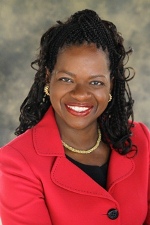Lawyers Debate Whether New Voter Registration Laws Fight Voter Fraud or Suppress Voter Activity

Barbara Arnwine.
Photo courtesy of the
Lawyer’s Committee
Forty-three states either have voter identification laws on the books or are considering legislation to enact them.
Supporters of those laws say they are trying to fight voter fraud. Opponents say the purpose is to suppress voter turnout.
Both sides had their say Sunday in a 90-minute panel discussion on “New Voter Registration Laws: Fighting Voter Fraud or Suppressing the Vote?” sponsored by the Criminal Justice Section and Section of State and Local Government Law.
The laws in a handful of states, including Pennsylvania, South Carolina and Texas, are under challenge by the U.S. Justice Department and alleged disenfranchised voters.
The poster child for the litigation nationally is Viviette Applewhite, a 93-year-old Philadelphia woman who voted for Franklin D. Roosevelt and in nearly every presidential election since. But the former World War II welder says she will not be able to vote because of a new law requiring her to produce a state-issued photo identification when she appears at her polling site.
“Applewhite marched with Martin Luther King but she doesn’t have a proper state ID because she was adopted and doesn’t have a birth certificate, probably because her birth certificate probably never existed,” Benjamin E. Griffith, a Mississippi lawyer who represents state and local governments, told those attending the program.
Griffith, who has written on the subject of voter ID laws, says both sides have their horror stories and statistics.
“The truth is probably somewhere in the middle,” he says. “I think there are exaggerations on both sides.”
South Carolina Attorney General Alan Wilson, who is defending one of those laws, listed a dozen reports of voter fraud. He pointed out that a dead dog named Mozart had been mailed a voter registration form and that six counties in Illinois have more registered voters than actual residents.
“Do these examples prove voter fraud? No, but it does raise concerns that it could happen,” says Wilson, who was introduced as the youngest state attorney general in the country.
Wilson pointed out that minority voting in Georgia, which passed a voter ID law in 2006, increased 40 percent between 2006 and 2010.
“Is it so nefarious to raise the standard to fulfill the constitutional right of voting to the level required to get on an airplane?” he asked.
Yes, responded Barbara Arnwine, president and executive director of the Lawyers Committee for Civil Rights Under Law.
“Pennsylvania officials admitted during its trial a couple weeks ago that it has no knowledge of even a single case of voter fraud,” said Arnwine. “In Florida, they severely restricted early voting and eliminated early voting the Sunday before the election, even though 30 percent of African Americans voted on that Sunday during 2008.”
Clarissa Martinez De Castro, director of State & Local Public Policy at National Council of La Raza, said Hispanics are targeted with robo calls and letters on the eve of elections threatening them and their families for prosecution if they show up to vote.
“Why is this kind of election fraud not being prosecuted as aggressively as voter ID issues?” she asked.
The Rev. Jesse L. Jackson, Sr., president and founder of the Rainbow PUSH Coalition, was also scheduled to speak, but didn’t make it to the panel Sunday.



